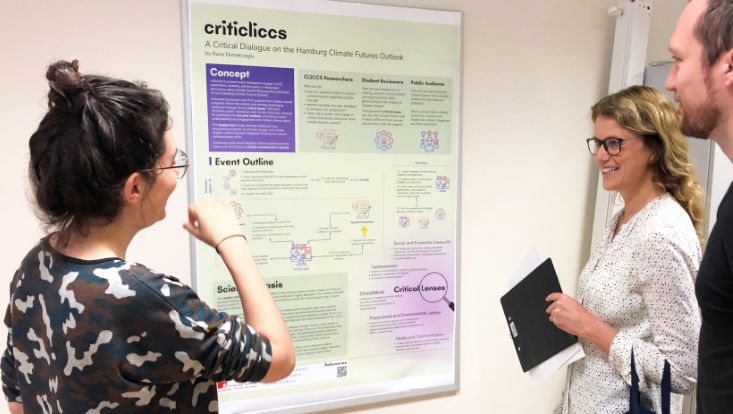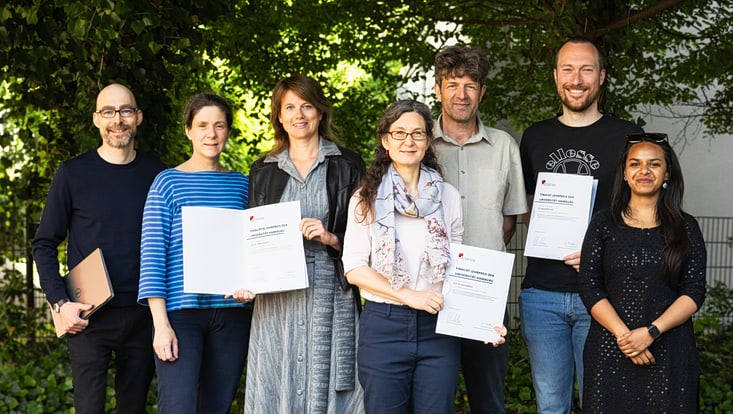SICSS students’ poster sessionResearching and shaping climate futures
31 July 2024, by Manuel Weidler

Photo: UniHH/CEN/S. Janssen
Will we break the two-degree limit? And what will happen to the climate if we do? Will we all have to give up meat in the future? How can we convince people to do so without appearing judgmental? Climate futures are full of uncertainty. At a poster session for the interdisciplinary course “Researching and Shaping Climate Futures,” students from the SICSS graduate school shared their ideas and approaches. Among the various outstanding posters, one calling for a radical role reversal especially caught people’s attention.
It’s one of many topics that are heatedly debated in connection with climate change: the effects of meat production on the climate. It’s a certainty that cows produce climate-harmful methane. What’s less certain, however, is what a dietary transformation might look like. Simply providing information on the harmful effects of consuming meat isn’t enough, as student Kyriakos-Stavros Malisovas showed in his poster. As he claims, in Western cultures there’s a deeply rooted social norm behind the tendency to offer guests meat: the more meat = the better the hospitality. It’s up to the scientific community to get to the bottom of such cultural connections – in part, so as to more effectively promote change. But researchers also need to be aware of the limitations of their own methods. For example, although today’s climate models are very good, they still can't tell us precisely which climate future will come to pass.
“We need to recognize that uncertainty is an inherent part of climate science.” says student Priscila Lazaro Vargas, summarizing the outcomes of the seminar,“Rather than being paralyzed by what we don't know, we should act decisively on what we do know, while remaining flexible enough to adjust as new information emerges.”
In her poster, student Rana Ekmekcioglu outlines a unique approach that involves a radical role reversal. Instead of researchers or educators evaluating students, it should be the other way around. In this regard, students would have their own panel (called “criticliccs”) for assessing the Hamburg Climate Futures Outlook– a central study in which the Cluster of Excellence CLICCS regularly shares its latest findings. “It’s a great idea,” says Prof. Simone Rödder, who co-led the seminar, “partly because our students are so diverse and hail from a broad range of countries. It also promotes dialogue between education and research.” That’s one of the main goals of the course, which was developed by an interdisciplinary team of eight educators and is coordinated by Prof. Lars Kutzbach and Prof. Matthias Revers.
“What’s particularly impressive is the range of topics the students chose to address in connection with climate futures and the ongoing research at the Cluster of Excellence CLICCS,” Rödder adds. “They responded well to the task and worked hard to find original solutions.” The topics vary from strategies to promote climate activism in India, to using roleplaying to help researchers gain a better understanding of political decision-makers, to strategies for a regional circular economy.

